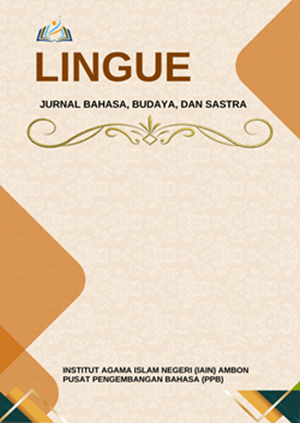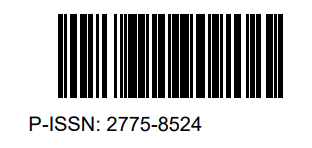THE NEED FOR LOVE AND AFFECTION: MASLOW’S HIERARCHY PERSPECTIVES IN ARIS’ BEHAVIOUR IN THE FILM IPAR ADALAH MAUT
DOI:
https://doi.org/10.33477/lingue.v7i1.8389Keywords:
affection, humanistic, maslow’s hierarchy perspective, needs, psychologyAbstract
Humans, as social beings, have a fundamental need for love and affection that is important for their psychological well-being. This study explores how the fulfillment of this need is portrayed through the character Aris in the film “Ipar adalah Maut” (Brother-in-Law Can Be a Curse). The purpose of this study is to describe the fulfillment of love and affection within the hierarchy of needs in Abraham Maslow's humanistic psychology theory. A qualitative descriptive method was used, with the film “Brother-in-Law Can be a Curse” as the primary data source. Data were collected through literature review and observation-note techniques. The findings of the study show that the need for love and affection in the character Aris is fulfilled through his social interaction with Rani, his sister-in-law. The fulfillment of these needs is evident from the closeness that is established because they live in the same house, the intensity of meetings on campus, and the attention and emotional support given by Rani, especially when Aris's need for affection is not fully fulfilled by his wife, Nisa. This illustrates the shift in the object of Aris's affection, which has an impact on the dynamics of the relationship in the story.
References
Adlini, M, N., dkk. (2022). Metode Penelitian Kualitatif Studi Pustaka. 6(1). 974-980. https://doi.org/10.33487/edumaspul.v6i1.3394
Ahmadi, A. (2019). Metode Penelitian Sastra. Graniti.
Ahmadi, A. (2023).Teori Sastra: Prespektif apresiatif. DELIMA.
Akbar, A. (2023). Faktor Pendukung dan Penghambat Aktualisasi Diri Berdasarkan Teori Maslow. Flourishing: Jurnal Psikologi Positif, 4(2), 84-92. https://doi.org/10.21009/flourishing.0402.01
Amiruddin, H. (2016). Pengantar Psikologi Umun. PeNa Banda Aceh.
Ananda, S. (2021). Penerapan Teori Kebutuhan Maslow pada Tokoh dalam Novel Pulang Karya Leila S. Chudori. Jurnal Kajian Sastra, 3(3), 45-57. https://doi.org/10.22373/kajiansastra.v3i3.12994
Anggraeni, F. (2018). Kebutuhan Sosial dan Aktualisasi Diri dalam Perahu Kertas Karya Dee Lestari. Jurnal Psikologi dan Sastra, 10(2), 120-132. https://doi.org/10.12345/jps.v10i2.312
Anggraini, A., & Darmawan, Y. (2018). Pemenuhan Kebutuhan Dasar pada Tokoh Utama dalam Novel Dilan 1990 Berdasarkan Hierarki Kebutuhan Maslow. Jurnal Bahasa dan Sastra, 10(2), 102-112.
https://doi.org/10.31940/basastra.v10i2.4722
Cahyani, D., & Widodo, P. (2020). Kebutuhan Keamanan pada Tokoh Utama dalam Film Twilight. Jurnal Bahasa dan Film, 9(3), 150-160.
https://doi.org/10.12345/jbf.v9i3.990
Firdaus, R., & Sasmita, D. (2019). Hierarki Kebutuhan Maslow pada Tokoh dalam Film Imperfect Karya Ernest Prakasa. Jurnal Film dan Sastra Indonesia, 7(1), 12-23. https://doi.org/10.24815/jfsi.v7i1.10230
Gayatri, K, B, S., & Putra, I, B, K, S. (2023) Pengembangan APE Kid’s Bag Dalam Menstimulasi Aspek Emosi Untuk Pembentukan Afeksi Anak Usia Dini: Jurnal Ilmiah Potensia, 8(2), 383-397.
Hartanto, S., & Setiawan, Y. (2019). Kebutuhan Dasar pada Tokoh Novel Sang Pemimpi Berdasarkan Teori Maslow. Jurnal Bahasa Indonesia dan Budaya, 7(2), 145-153. https://doi.org/10.12345/jbib.v7i2.543
Kurniawan, M. (2018). Pemenuhan Kebutuhan Psikologis dalam Novel Cinta Brontosaurus oleh Raditya Dika. Jurnal Psikologi Sastra Indonesia, 4(2), 95-
105. https://doi.org/10.12345/jpsi.v4i2.321
Lasmana Fajar Hapriyanto, Shofia Permata Sari, Moh Rif’an Hidayatullah, & Mintowati. (2024). Penggunaan Media Video Youtube &Quot;Sd63 Bagaimana Menyimak Yang Efektif” dalam Pembelajaran Keterampilan Menyimak. Paramasastra : Jurnal Ilmiah Bahasa Sastra dan Pembelajarannya, 11(2), 289–301. https://doi.org/10.26740/paramasastra.v11n2.p289-301
Lestari, I., & Hasanah, M. (2018). Pemenuhan Kebutuhan Harga Diri pada Tokoh Novel Anak Bajang Menggiring Angin. Jurnal Sastra Indonesia dan Psikologi, 5(3), 145-154. https://doi.org/10.12345/jsip.v5i3.111
Maharani, S. (2021). Aktualisasi Diri dalam Novel Supernova Karya Dee Lestari: Pendekatan Teori Maslow. Jurnal Budaya dan Sastra Indonesia, 14(1), 70-80. https://doi.org/10.12345/jbsi.v14i1.456
Maslow, A. H. (1987). Motivation and personality (3rd ed.). Harper & Row.
Nurainy, F., & Fathiyah, N. (2019). Analisis Hierarki Kebutuhan pada Tokoh dalam Novel Laskar Pelangi Karya Andrea Hirata. Jurnal Pendidikan Bahasa dan Sastra Indonesia, 7(2), 100-110. https://doi.org/10.21009/bs.2019.07205
Nurhidayat, B., & Suryani, A. (2019). Hierarki Kebutuhan pada Karakter dalam Novel 5 cm. Jurnal Pendidikan dan Sastra Indonesia, 8(2), 123-133. https://doi.org/10.12345/jpsi.v8i2.123
Nurwahidah, A., dkk. (2023). Hierarki kebutuhan tokoh utama dalam novel represi karya fah Rezina Amalia: kajian psikologi sastra Abraham Maslow. 7(4). 1399- 1408.
Prasetya, R. D., & Susanti, L. (2021). Aktualisasi Diri Tokoh Utama dalam Dilan 1990 Berdasarkan Hierarki Kebutuhan Maslow. Jurnal Sastra Kontemporer, 15(2), 102-110. https://doi.org/10.12345/jsk.v15i2.789
Prasetyo, B., & Utami, M. (2021). Penerapan Teori Maslow pada Tokoh Utama dalam Film Milea: Suara dari Dilan. Jurnal Bahasa dan Sastra Indonesia UNPAM, 10(1), 55-63. https://doi.org/10.32493/jbsi.v10i1.11711
Punjabi, M. (2024). Ipar adalah Maut. MD Pictures., Dapur Film.
Purwaningsih, E. (2023). Kebijakan Terkait Krisis Kesehatan: Analisa Kebutuhan Tenaga Kesehatan Selama Pandemi Covid-19. Jurnal Kebijakan Kesehatan Indonesia, 12(2), 101-112. https://doi.org/10.22146/jkk.4303
Putri, F., & Aryanto, R. (2021). Analisis Teori Kebutuhan Maslow dalam Novel Hujan Karya Tere Liye. Jurnal Literasi Indonesia, 10(1), 88-96. https://doi.org/10.12345/jli.v10i1.891
Putri, V. E. A., Raharjo, R., & Ahmadi, A. (2024). Perspektif Hierarki Kebutuhan Maslow Pada Novel" My Perfect Imperfection" Karya Erlin Cahyadi. Diksatrasia: Jurnal Ilmiah Pendidikan Bahasa dan Sastra Indonesia, 8(1), 165-173. http://dx.doi.org/10.25157/diksatrasia.v8i1.12215
Rafi, M. (2023). Hierarki kebutuhan tokoh utama Dokter Tono dala Novel Belenggu Karya Armijin Pane. 17(2). 116-130.
Rahayu, L. (2019). Analisis Hierarki Kebutuhan pada Tokoh Novel Bulan Karya Tere Liye. Jurnal Ilmu Sosial dan Sastra Indonesia, 8(3), 102-111. https://doi.org/10.12345/jissi.v8i3.444
Rahmadania, A. ., & Aly, H. N. (2023). Implementasi Teori Hirarchy Of Needs Maslow Dalam Meningkatkan Motivasi Belajar Di Yayasan Cahaya Generasi
Islam Kota Bengkulu. Jurnal Pendidikan Dan Konseling (JPDK), 5(4), 261–
272. https://doi.org/10.31004/jpdk.v5i4.17456
Rahman, F. (2011). Perspektif Multikultural dan Aktualisasi Diri dalam Psikologi Sufistik. Tarbiyatuna: Jurnal Pendidikan Agama Islam, 1(1), 43-55. https://doi.org/10.30762/tarbiyatuna.v1i1.567
Rahman, T., & Widodo, F. (2020). Studi Tentang Aktualisasi Diri Tokoh Utama dalam Novel Sang Pemimpi Karya Andrea Hirata. Jurnal Pendidikan Bahasa dan Sastra, 8(2), 121-130. https://doi.org/10.17977/jurnalpbsi.v8i2.11199
Rahmawati, R. (2021). Analisis Pemenuhan Kebutuhan Psikologis dalam Novel Negeri Lima Menara. Jurnal Kajian Sastra Indonesia, 6(1), 115-125. https://doi.org/10.12345/jksi.v6i1.788
Sofyan, D. H. (2020). Kebutuhan Sosial Tokoh Utama dalam Film Imperfect. Jurnal Psikologi dan Film Indonesia, 6(2), 135-145.
https://doi.org/10.12345/jpfi.v6i2.678
Subaidi, S., & Muazaroh, M. (2019). Kebutuhan Manusia dalam Pemikiran Abraham Maslow. Al-Mazahib: Jurnal Ilmu Keislaman dan Sosial, 7(1), 17–33. https://doi.org/10.29062/al-mazahib.v7i1.99
Sunarya, F, R. (2022). Urgensi teori hirarki kebutuhan dari Abraha Maslow dalam sebuah organisasi, 9(2), 647-658. 10.15408/sjsbs.v9i3.25916
Downloads
Published
How to Cite
Issue
Section
License
If accepted for publication, the copyright of the article belongs to the author. Copyright includes the exclusive right to reproduce or transmit manuscripts in any form and media: reprint, produce photographs, microfilm, or translated versions of the manuscript. Increasing parts of this journal, storage and transmission of databases of any form or media, such as electronic copies, electrostatic and mechanical copies, photocopies, recordings, magnetic media and so on are permitted without permission. LINGUE: Jurnal Bahasa, Budaya dan Sastra, allow readers to read, download, copy, distribute, print, search, or link the fulltext of its articles and allow readers to use them for any other lawful purpose. However, it can not be used for commercial purposes
Jika diterima untuk publikasi, hak cipta artikel adalah milik penulis. Hak Cipta mencakup hak eksklusif untuk mereproduksi atau mengirimkan manuskrip dalam bentuk dan media apa pun: mencetak ulang, menghasilkan foto, mikrofilm, atau versi terjemahan dari manuskrip tersebut. Memperbanyak bagian jurnal ini, penyimpanan dan transmisi database dalam bentuk atau media apa pun, seperti salinan elektronik, salinan elektrostatis dan mekanis, fotokopi, rekaman, media magnetis, dan sebagainya diizinkan tanpa izin. LINGUE: Jurnal Bahasa,Budaya dan Sastra, memungkinkan pembaca untuk membaca, mengunduh, menyalin, mendistribusikan, mencetak, mencari, atau menautkan teks lengkap artikelnya dan memungkinkan pembaca untuk menggunakannya untuk tujuan yang sah lainnya. Namun, tidak dapat digunakan untuk tujuan komersial

LINGUE : Jurnal Bahasa, Budaya, dan Sastra Ciptaan disebarluaskan di bawah Lisensi Creative Commons Atribusi-TanpaTurunan 4.0 Internasional.







